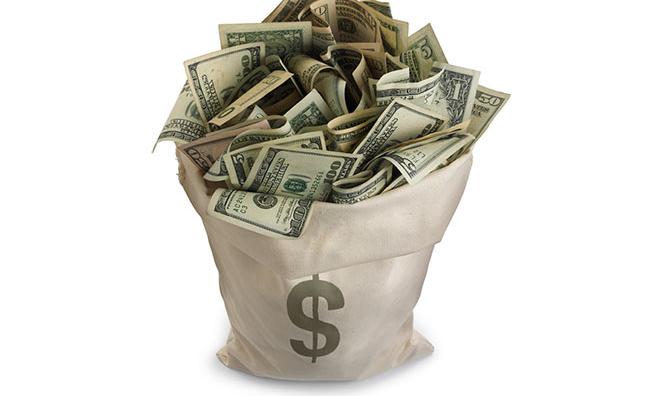Whether lucky, smart, or both, Apple's recent bond issuance was done just before the market for bonds began to turn, saving the iPhone maker more than $724 million in interest savings on the debt it incurred.
In order to return $100 billion to shareholders by 2015, Apple issued its first bond sale in 17 years, borrowing $17 billion in the largest sale of its kind. Apple's bond issuance beat out the previous record holder, Roche Holding AG, by half a billion dollars. According to an analysis from Bloomberg, the bond sale was also perfectly timed, allowing Apple to capture low yields and saving the company an initial $40 million in annual interest payments on the six bonds it sold.
On the day Apple issued its bond offering, the yield on 10-year Treasury bonds — the basis upon which the rest of the industry determines its own rates — stood at 1.67 percent. By the end of last week, that figure had risen to 2.13 percent. The manager of the world's biggest fixed-income fund said he believes that a three-decade-long bull market in bonds ended the day before Apple issued its bonds, meaning the Cupertino company got in just in time.
"That's real money, even to Apple," one money manager reportedly said. "I don't know if it was insight or luck, but they timed the market very well."
Apple's notes received the second-highest possible grade at both Moody's Investors Service (Aa1) and Standard & Poor's (AA+).
The biggest savings will come from the longest-dated securities, due in May of 2043. Had the company sold its bonds on May 31, it would have incurred an additional $396.9 million in annual interest costs.
These newly discovered savings come in addition to the tax savings that inspired the bond offering in the first place. By taking on $17 billion in debt, Apple was able to grow its quarterly dividend and repurchase shares, putting a floor under its stock price, which had been hammered in recent months. Going the debt route allowed Apple to avoid paying $9.2 billion in taxes to the United States government on profits earned abroad.
Apple Chief Financial Officer Peter Oppenheimer — architect of the bond issuance and the highest paid CFO in the world — said that incorporating debt into Apple's capital structure would ultimately be beneficial to the company and an efficient use of its balance sheet.
"We will maintain sufficient domestic liquidity," Oppenheimer said during the company's quarterly earnings conference call, "to grow the business and execute capital expenditures and acquisitions. The program announced today will result in returning an average of $30 billion annually to shareholders."
 AppleInsider Staff
AppleInsider Staff







-m.jpg)






 Malcolm Owen
Malcolm Owen
 William Gallagher
William Gallagher
 Charles Martin
Charles Martin
 Christine McKee
Christine McKee
 Wesley Hilliard
Wesley Hilliard

 Andrew Orr
Andrew Orr








7 Comments
I wish I could save 724 million by juggling my savings and moving my money around. I guess its true - you need money to make money. I'm talking shedloads.
I wish I could save 724 million by juggling my savings and moving my money around. I guess its true - you need money to make money. I'm talking shedloads.
They didn't "juggle" money around.
They sold bonds. If they sold them a week later, it would have cost them $724 million. Had the market gone the other direction, the story could have read "Apple's untimely bond sale cost the company $724 million"
They had no control over the movement of the bond market.
The headline should probably make it a little more clear that this entire story is about timing and nothing more.
They didn't "juggle" money around.
They sold bonds. If they sold them a week later, it would have cost them $724 million. Had the market gone the other direction, the story could have read "Apple's untimely bond sale cost the company $724 million"
They had no control over the movement of the bond market.
The headline should probably make it a little more clear that this entire story is about timing and nothing more.
I spoke in jest. I do understand the difference between juggling and selling bonds.
[quote name="bobringer" url="/t/157823/apples-timely-bond-sale-saved-company-724-million#post_2337524"] They didn't "juggle" money around. They sold bonds. If they sold them a week later, it would have cost them $724 million. Had the market gone the other direction, the story could have read "Apple's untimely bond sale cost the company $724 million" They had no control over the movement of the bond market. The headline should probably make it a little more clear that this entire story is about timing and nothing more. [/quote] Actually, there's probably a cause and effect relationship. Apple's massive bond sale took $17 B of investment capital off the table. The following week, there was less cash available, which means that the borrowers would have to pay a higher interest rate. It really didn't matter when Apple sold those bonds. It would likely have caused the interest rate to go up if they had waited a week - so there is a high probability that this effect would have been true regardless of the date.
It's all good, but let's not confuse luck with skill. No one can predict the market, especially in the short run. Apple could easily lose that amount or more from the repurchase and how the various tranches are timed (relative to how how Apple's stock price moves over the duration of the repurchase program). [U]Edit[/U]: Typo